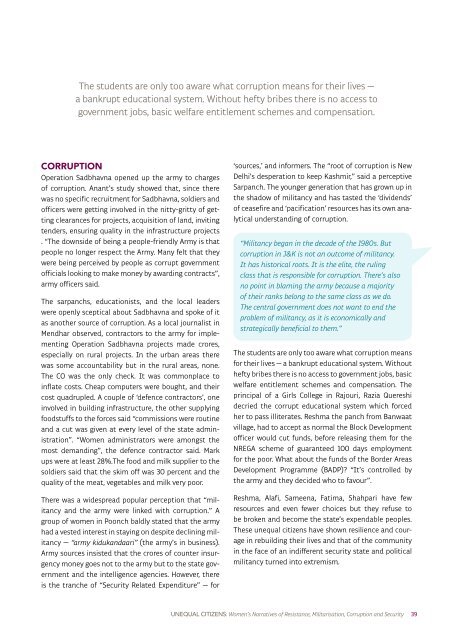CC_India
CC_India
CC_India
Create successful ePaper yourself
Turn your PDF publications into a flip-book with our unique Google optimized e-Paper software.
The students are only too aware what corruption means for their lives —<br />
a bankrupt educational system. Without hefty bribes there is no access to<br />
government jobs, basic welfare entitlement schemes and compensation.<br />
CORRUPTION<br />
Operation Sadbhavna opened up the army to charges<br />
of corruption. Anant’s study showed that, since there<br />
was no specific recruitment for Sadbhavna, soldiers and<br />
officers were getting involved in the nitty-gritty of getting<br />
clearances for projects, acquisition of land, inviting<br />
tenders, ensuring quality in the infrastructure projects<br />
. “The downside of being a people-friendly Army is that<br />
people no longer respect the Army. Many felt that they<br />
were being perceived by people as corrupt government<br />
officials looking to make money by awarding contracts”,<br />
army officers said.<br />
The sarpanchs, educationists, and the local leaders<br />
were openly sceptical about Sadbhavna and spoke of it<br />
as another source of corruption. As a local journalist in<br />
Mendhar observed, contractors to the army for implementing<br />
Operation Sadbhavna projects made crores,<br />
especially on rural projects. In the urban areas there<br />
was some accountability but in the rural areas, none.<br />
The CO was the only check. It was commonplace to<br />
inflate costs. Cheap computers were bought, and their<br />
cost quadrupled. A couple of ‘defence contractors’, one<br />
involved in building infrastructure, the other supplying<br />
foodstuffs to the forces said “commissions were routine<br />
and a cut was given at every level of the state administration”.<br />
“Women administrators were amongst the<br />
most demanding”, the defence contractor said. Mark<br />
ups were at least 28%.The food and milk supplier to the<br />
soldiers said that the skim off was 30 percent and the<br />
quality of the meat, vegetables and milk very poor.<br />
There was a widespread popular perception that “militancy<br />
and the army were linked with corruption.” A<br />
group of women in Poonch baldly stated that the army<br />
had a vested interest in staying on despite declining militancy<br />
— “army kidukandaari” (the army’s in business).<br />
Army sources insisted that the crores of counter insurgency<br />
money goes not to the army but to the state government<br />
and the intelligence agencies. However, there<br />
is the tranche of “Security Related Expenditure” — for<br />
‘sources,’ and informers. The “root of corruption is New<br />
Delhi’s desperation to keep Kashmir,” said a perceptive<br />
Sarpanch. The younger generation that has grown up in<br />
the shadow of militancy and has tasted the ‘dividends’<br />
of ceasefire and ‘pacification’ resources has its own analytical<br />
understanding of corruption.<br />
“Militancy began in the decade of the 1980s. But<br />
corruption in J&K is not an outcome of militancy.<br />
It has historical roots. It is the elite, the ruling<br />
class that is responsible for corruption. There’s also<br />
no point in blaming the army because a majority<br />
of their ranks belong to the same class as we do.<br />
The central government does not want to end the<br />
problem of militancy, as it is economically and<br />
strategically beneficial to them.”<br />
The students are only too aware what corruption means<br />
for their lives — a bankrupt educational system. Without<br />
hefty bribes there is no access to government jobs, basic<br />
welfare entitlement schemes and compensation. The<br />
principal of a Girls College in Rajouri, Razia Quereshi<br />
decried the corrupt educational system which forced<br />
her to pass illiterates. Reshma the panch from Banwaat<br />
village, had to accept as normal the Block Development<br />
officer would cut funds, before releasing them for the<br />
NREGA scheme of guaranteed 100 days employment<br />
for the poor. What about the funds of the Border Areas<br />
Development Programme (BADP)? “It’s controlled by<br />
the army and they decided who to favour”.<br />
Reshma, Alafi, Sameena, Fatima, Shahpari have few<br />
resources and even fewer choices but they refuse to<br />
be broken and become the state’s expendable peoples.<br />
These unequal citizens have shown resilience and courage<br />
in rebuilding their lives and that of the community<br />
in the face of an indifferent security state and political<br />
militancy turned into extremism.<br />
UNEQUAL CITIZENS: Women’s Narratives of Resistance, Militarisation, Corruption and Security<br />
39


